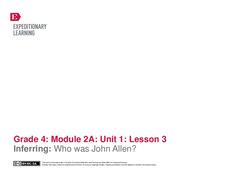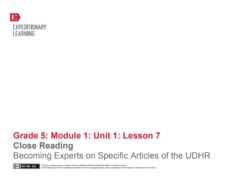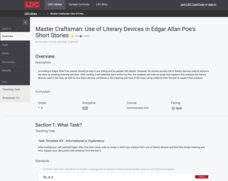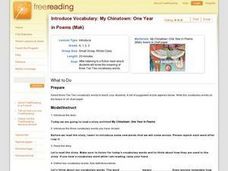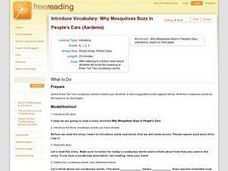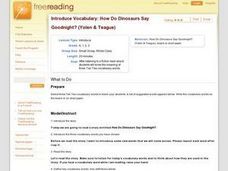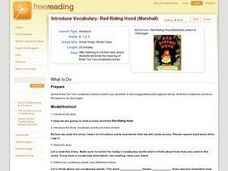EngageNY
Inferring: Who was John Allen?
Help your learners work with difficult or archaic words. A continuation of lesson two of this module, the plan here focuses on deciphering the Inventory of John Allen, in particular the unfamiliar words that make up much of the list. Add...
EngageNY
Resource Materials and Gathering Information: Reading Another “Choice” Text from the Research Folder
Look it up. Scholars use a dictionary and thesaurus to verify the meaning of the research vocabulary words they defined in the previous activity. They then use sticky notes to write a synonym for each word. Finally, individuals choose a...
EngageNY
Close Reading: Becoming Experts on Specific Articles of the UDHR
A continuation of the previous lesson, which is part of a larger group of lessons on human rights (see additional materials). Here, in Lesson 7, your class will explore more articles from the Universal Declaration of Human Rights. After...
EngageNY
Mid-Unit Assessment and Discussing Themes in Esperanza Rising: (Chapter 9: "Las Ciruelas/PLums")
Give this skills-based assessment halfway through your unit on Esperanza Rising. After a brief review, class members take the test, which asks them to show that they know how to analyze the novel independently. They are asked to...
EngageNY
Analyzing Text Structure: “Water Is Life” Paragraphs
Water, water everywhere. Readers revisit paragraphs six through nine in the article "Water is Life" to answer text-dependent questions. They then pair up to reread the article focusing on its structure and record their thoughts on...
EngageNY
End of Unit 1 Assessment: Inferring and Synthesizing (From Two Texts) About Life in Colonial America
Close your colonial America unit with a performance-based assessment. Class members will show their proficiency in several skills including using details to back up inferences, determining the meaning of words in context,...
EngageNY
Grade 11 ELA Module 2: Unit 1, Lesson 14
Leave the past in the past. Scholars read paragraph 12 of the chapter "Of Our Spiritual Strivings" to analyze Du Bois's development of gaining liberty and leaving the ideas of the past. Pupils then carry out a three to five-minute...
EngageNY
Reading for Gist, Answering Text-Dependent Questions, and Determining Author’s Purpose: Industrial Organic Food Chain
After re-reading The Omnivore’s Dilemma using a Reading Closely: Guiding Questions handout, class members use sticky notes to annotate and determine the gist of the text. Finally, they use an Author’s Purpose graphic organizer to...
EngageNY
Research: Paraphrasing Relevant Information
Readers take a look at the source Ethical Style: How Is My T-Shirt Made? and discuss how to say the information in the article without plagiarism. Learners make note of and underline sentences that may present a problem in paraphrasing....
EngageNY
Taking Notes and Citing Quotes from Text: Gathering Information on our Rainforest Insects
In other words. Scholars practice using paraphrasing and quotes. They partner in pairs to write a paraphrase for an information text strip. Individuals then use their skills to paraphrase information from the text Fire Ants.
Literacy Design Collaborative
Master Craftsman: Use of Literary Devices in Edgar Allan Poe's Short Stories
Make the writing process a breeze for literary lovers. Scholars identify literary elements in Poe's The Tell-Tale Heart. They then choose their own short story from Edgar Allan Poe and repeat the processes independently. The final...
Curated OER
Introduce Vocabulary: The Reasons for the Seasons
Students assess the meaning of new vocabulary words. In this vocabulary lesson, students read The Reasons for the Seasons and evaluate the meaning of tier two vocabulary words. Students record their words using a word journal or...
Curated OER
Introduce: The Suffix -ed
Students examine language. In this word-making instructional activity, students discover the meaning of the suffix -ed. They work in small groups to create a list of words using this suffix. This instructional activity includes...
Curated OER
Introduce: The Prefixes un- and dis-
Students study language. In this word-making lesson, students discover the meanings of the prefixes un- and dis-. They work in small groups to create a list of words using these prefixes. This lesson includes modifications for ELL...
Curated OER
Introduce Vocabulary: It's Pumpkin Time
Students predict the meaning of tier two vocabulary words. In this vocabulary lesson, students investigate the meaning of new vocabulary words while reading It's Pumpkin Time. Students record their new words in a word journal or...
Curated OER
Introduce Vocabulary: My Chinatown: One Year in Poems
Students explore tier two vocabulary words. In this vocabulary instructional activity, students work in small groups assessing the meaning of new vocabulary words. Students record vocabulary in a word journal or discovery chart.
Curated OER
Introduce Vocabulary: Why Mosquitos Buzz in People's Ears
Students determine the meaning of tier two vocabulary words. In this vocabulary lesson, students read Why Mosquitos Buzz in People's Ears and explore new vocabulary words found in the story. Students record their discoveries in a word...
Curated OER
ACROSTIC POETRY
Students use newspapers or magazines to create an acrostic poem where words are divided into parts of speech.
Curated OER
Introduce Vocabulary: How Do Dinosaurs Say Goodnight?
Young scholars explore tier two vocabulary. In this vocabulary lesson, students read How Do Dinosaurs Say Goodnight? and assess the meaning of new vocabulary words found in the story. Young scholars record their new words using a word...
Curated OER
Introduce Vocabulary: Welcome to the Ice House
Students study tier two vocabulary words. In this vocabulary lesson, students explore new vocabulary words found while reading Welcome to the Ice House. Students assess the meaning of their new vocabulary words and record their learning...
Curated OER
Introduce Vocabulary: Red Riding Hood
Students study tier two vocabulary words. In this vocabulary lesson, students read Red Riding Hood and investigate tier two vocabulary words found in the story. Students analyze the meaning of vocabulary words and record their...
Curated OER
Introduce Vocabulary: Ruby the Copycat
Students analyze tier two vocabulary words. In this vocabulary lesson, students explore vocabulary words used in Ruby the Copycat. Students assess the meaning of new vocabulary words and record their new words in a word journal.
Curated OER
Introduce Vocabulary: Smoky Night
Students investigate tier two vocabulary words. In this vocabulary lesson plan, students assess the meaning of vocabulary words found while reading Smoky Night. Students record their new vocabulary words using a word journal or discovery...
Curated OER
Introduce Vocabulary: The Keeping Quilt
Students consider tier two vocabulary words. In this vocabulary lesson, students investigate the meaning of new vocabulary words found while reading The Keeping Quilt. Students record their new vocabulary words using a word journal or...
Other popular searches
- Multiple Word Meanings
- Word Meanings in Context
- Foreign Word Meanings
- Word Meanings From Context
- Similar Word Meanings
- Clarify Word Meanings
- Vocabulary. Word Meanings
- Word Meanings Lesson Plans
- Glossary Word Meanings
- Meanings of Word Parts
- Word Meanings/definitions
- Multiple Word Meanings 4th


